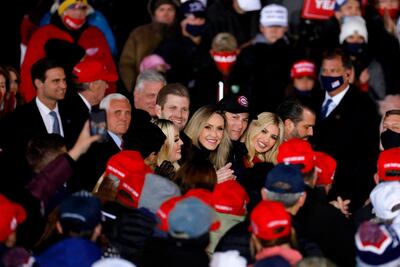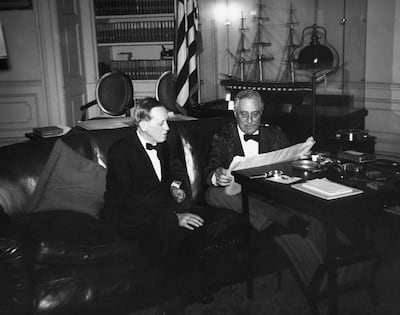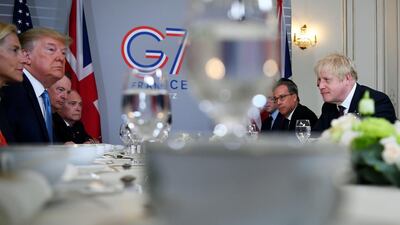Donald Trump lives in a cocoon. He is surrounded by White House staff, advisers, family, and people who allow him to cheat at golf so that he can be happy claiming to "win". He also has 71 million voters behind him. But does Mr Trump have any friends – people he trusts to tell him the truth about the mess that he is in and the risks for his country if he refuses to concede the election?
Since Mr Trump is Number One in his personal universe, it must be difficult to have true pals. Nor does he show much loyalty to his enablers.
Kathryn Dunn Tenpas of Washington's Brookings Institution this month produced a kind of spreadsheet called "Tracking the Turnover in the Trump Administration". It's fascinating to read. Both what Ms Tenpas calls Mr Trump's "A-Team" of top officials and a separate set of calculations for Mr Trump's cabinet appointees show a high level of churn. He changes key appointments more often than any other president in the study going back 40 years. Even in defeat Mr Trump is using his lame-duck presidency to clear out top officials at the Department of Defence.
His TV career suggests he enjoys firing people, but he also belittles them. He fired one of his communications managers, Anthony Scaramucci, and later tweeted: "Anthony Scaramucci, who was quickly terminated [in 11 days] from a position that he was totally incapable of handling, now seems to do nothing but television as the all-time expert on 'President Trump'. Like many other so-called television experts, he knows very little about me." But if Mr Scaramucci was so obviously "totally incapable", why exactly did Mr Trump hire him?

The same judgement questions occur in Britain. Prime Minister Boris Johnson has just cleared out two of his most controversial appointments, Dominic Cummings and Lee Cain. Mr Cummings and Mr Cain worked together on Vote Leave, the campaign to get Britain out of the European Union. Mr Cummings advised Mr Johnson to get rid of non-partisan top civil servants to shake up the so-called "Whitehall elite" that he despised. Many quit or were forced out – in Britain it's often unclear which – and now it's Mr Cummings and Mr Cain's turn to go. Whether they jumped or were pushed is again a matter of debate.
What is certain is that these two ardent pro-Brexit campaigners are leaving just as their central ambition, Brexit itself, becomes a reality.
It's probably a lucky escape before the ship of state hits the rocks, or at least chaos at the ports. Road hauliers, truckers and shippers are deeply worried about shipping bottlenecks and traffic jams on major roads to the coast. Some hope Mr Johnson is finally coming to terms with how destructive a "No Deal" Brexit will be, and that he will now accept a compromise deal with the EU. As this column has argued – literally for years – a No Deal Brexit will seriously damage the UK economy, while a negotiated deal will do less damage. But a deal that is better for Britain may be much worse for Mr Johnson.
Reform UK party leader Nigel Farage forecasts betrayal. He tweeted: “It is well documented that I have never liked Dominic Cummings but he has backed Brexit. Seeing him leave Number 10 carrying a cardboard box tells me a Brexit sell-out is close.” The "Brexit Beast" can never be satisfied. It eats its own.
In difficult times therefore, Mr Johnson, like Mr Trump, is in need of a friend. But who can he trust? Mr Johnson, again like Mr Trump, has cleared out those brave enough to tell him what he does not want to hear. His cabinet is replete with yes-men and yes-women.
Mr Trump and Mr Johnson both lack a Harry Hopkins. He was the key adviser of former US president Franklin D Roosevelt in the 1930s and 40s. Hopkins held various formal roles, including that of commerce secretary, but it was as Roosevelt’s friend and fixer that Hopkins shines in history, acting as liaison between Roosevelt and former British prime minister Winston Churchill in the Second World War.

Churchill also trusted him implicitly. Hopkins suggested to Roosevelt that he should explain to the American people the US needed to be the “arsenal of democracy” helping Britain stand up to Adolf Hitler. Roosevelt once told a political rival that being president was such a lonely job “and you’ll discover the need for someone like Harry Hopkins who asks for nothing except to serve you".
It’s too late for Mr Trump. Perhaps some member of his family will be brave enough to tell him the facts. The votes are in and he has definitively lost the presidency. But family loyalty and friendship are not the same.
It may also be too late for Mr Johnson. Whatever he does on Brexit is not going to please everyone, and may please no one. Harry Truman, Roosevelt’s successor in the White House, once advised, “if you want a friend in Washington, get a dog". Mr Johnson already has a dog. He’s called Dilyn. Dilyn appears only occasionally in photo-opportunities and his advice on Brexit may, like much of the British debate, simply be barking.
Gavin Esler is a broadcaster and UK columnist for The National


